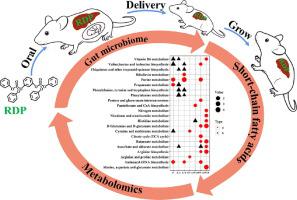当前位置:
X-MOL 学术
›
Environ. Int.
›
论文详情
Our official English website, www.x-mol.net, welcomes your
feedback! (Note: you will need to create a separate account there.)
Maternal transfer of resorcinol-bis(diphenyl)-phosphate perturbs gut microbiota development and gut metabolism of offspring in rats
Environment International ( IF 10.3 ) Pub Date : 2023-06-15 , DOI: 10.1016/j.envint.2023.108039 Hongli Liu , Yixiu Bai , Yingying Yu , Zenghua Qi , Guoxia Zhang , Guiying Li , Yingxin Yu , Taicheng An
Environment International ( IF 10.3 ) Pub Date : 2023-06-15 , DOI: 10.1016/j.envint.2023.108039 Hongli Liu , Yixiu Bai , Yingying Yu , Zenghua Qi , Guoxia Zhang , Guiying Li , Yingxin Yu , Taicheng An

|
Resorcinol-bis(diphenyl)-phosphate (RDP), an emerging organophosphate flame retardant, is increasingly used as a primary alternative for decabromodiphenyl ether and is frequently detected in global environmental matrices. However, the long-term effects of its exposure to humans remain largely unknown. To investigate its intergenerational transfer capacity and health risks, female Sprague Dawley rats were orally exposed to RDP from the beginning of pregnancy to the end of the lactation period. The RDP content, gut microbiota homeostasis, and metabolic levels were determined. RDP accumulation occurred in the livers of maternal rats and offspring and increased with exposure time. 16S rRNA gene sequencing showed that exposure to RDP during pregnancy and/or lactation significantly disrupted gut microbiota homeostasis, as evidenced by decreased abundance and diversity. In particular, the abundance of , , and decreased, correlating significantly with glycollipic metabolism. This finding was consistent with the reduced levels of short-chain fatty acids, the crucial gut microbial metabolites. Meanwhile, RDP exposure resulted in changes in gut microbiome-related metabolism. Nine critical overlapping KEGG metabolic pathways were identified, and the levels of related differential metabolites decreased. Our results suggest that the significant adverse impacts of RDP on gut microbiota homeostasis and metabolic function may increase the long-term risks related to inflammation, obesity, and metabolic diseases.
中文翻译:

间苯二酚-双(二苯基)-磷酸酯的母体转移扰乱大鼠肠道微生物群发育和后代肠道代谢
间苯二酚双(二苯基)磷酸酯 (RDP) 是一种新兴的有机磷酸酯阻燃剂,越来越多地用作十溴二苯醚的主要替代品,并且经常在全球环境基质中检测到。然而,其对人类的长期影响仍然很大程度上未知。为了研究其代际传递能力和健康风险,雌性Sprague Dawley大鼠从怀孕开始到哺乳期结束都口服RDP。测定了 RDP 含量、肠道微生物群稳态和代谢水平。 RDP 积累发生在母鼠和子代的肝脏中,并随着暴露时间的增加而增加。 16S rRNA 基因测序表明,怀孕和/或哺乳期间暴露于 RDP 会显着破坏肠道微生物群的稳态,丰度和多样性下降就证明了这一点。特别是, 、 和 的丰度下降,与糖脂代谢显着相关。这一发现与短链脂肪酸水平的降低是一致的,短链脂肪酸是重要的肠道微生物代谢物。同时,RDP 暴露导致肠道微生物组相关代谢发生变化。确定了九个关键重叠的 KEGG 代谢途径,相关差异代谢物的水平下降。我们的研究结果表明,RDP 对肠道微生物群稳态和代谢功能的显着不利影响可能会增加与炎症、肥胖和代谢疾病相关的长期风险。
更新日期:2023-06-15
中文翻译:

间苯二酚-双(二苯基)-磷酸酯的母体转移扰乱大鼠肠道微生物群发育和后代肠道代谢
间苯二酚双(二苯基)磷酸酯 (RDP) 是一种新兴的有机磷酸酯阻燃剂,越来越多地用作十溴二苯醚的主要替代品,并且经常在全球环境基质中检测到。然而,其对人类的长期影响仍然很大程度上未知。为了研究其代际传递能力和健康风险,雌性Sprague Dawley大鼠从怀孕开始到哺乳期结束都口服RDP。测定了 RDP 含量、肠道微生物群稳态和代谢水平。 RDP 积累发生在母鼠和子代的肝脏中,并随着暴露时间的增加而增加。 16S rRNA 基因测序表明,怀孕和/或哺乳期间暴露于 RDP 会显着破坏肠道微生物群的稳态,丰度和多样性下降就证明了这一点。特别是, 、 和 的丰度下降,与糖脂代谢显着相关。这一发现与短链脂肪酸水平的降低是一致的,短链脂肪酸是重要的肠道微生物代谢物。同时,RDP 暴露导致肠道微生物组相关代谢发生变化。确定了九个关键重叠的 KEGG 代谢途径,相关差异代谢物的水平下降。我们的研究结果表明,RDP 对肠道微生物群稳态和代谢功能的显着不利影响可能会增加与炎症、肥胖和代谢疾病相关的长期风险。

































 京公网安备 11010802027423号
京公网安备 11010802027423号